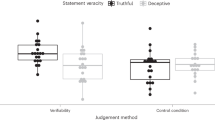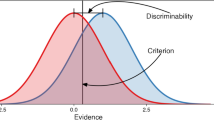Abstract
The present study examined the impact of viewing condition on accuracy in detecting deception. In Experiment 1, observers saw: 1) a single interview for each subject and then judged whether it was honest or deceptive; or 2) two interviews for each subject, and then judged which one was deceptive. All observers were given the full audiovisual record; they were able to see the face and the entire body and to hear the speech as it was spoken. As predicted, detection accuracy when two interviews were available for comparison was significantly higher than accuracy for a single interview. In both cases, however, mean detection accuracy was not significantly different from chance. In Experiment 2, the impact of viewing order of the two interviews (honest first vs. deception first) was assessed. When honest interviews were shown first, judges' accuracy was significantly greater than when deceptive interviews were shown first, and it was also significantly better than chance. Heuristics such as anchoring and representativeness may account for this phenomenon. Reasons for observers' inability to detect deception in this, and other studies, are discussed.
Similar content being viewed by others
References
Brandt, D.R., Miller, G.R., & Hocking, J.E. (1980). The truth-deception attribution: Effects of familiarity on the ability of observers to detect deception.Human Communication Research, 6 99–110.
Bugental, D., Kaswan, J., & Love, L. (1980). Perception of contradictory meanings conveyed by verbal and nonverbal channels.Journal of Personality and Social Psychology, 16 647–655.
DePaulo, B.M. & Pfeifer, R.L. (1986). On-the-job experience and skill at detecting deception.Journal of Applied Social Psychology, 16 249–267.
DePaulo, B.M., & Rosenthal, R. (1979). Telling lies.Journal of Personality and Social Psychology, 37 1713–1722.
DePaulo, B.M., Stone, J.I., & Lassiter, G.D. (1985). Deceiving and detecting deceit. In B.R. Schlenker (Ed.)The self and social life. New York: McGraw-Hill.
Ekman, P. (1985).Telling lies: Clues to deceit in the marketplace, marriage, and politics New York: W.W. Norton.
Ekman, P., & Friesen, W.V. (1974). Detecting deception from body or face.Journal of Personality and Social Psychology, 29 288–298.
Ekman, P., Friesen, W.V., & Ancoli, S. (1980). Facial signs of emotional experience.Journal of Personality and Social Psychology, 39 1125–1134.
Ekman, P., Friesen, W.V., & O'Sullivan, M. (1988). Smiles when lying.Journal of Personality and Social Psychology, 54 414–420.
Ekman, P., Friesen, W.V., O'Sullivan, M., & Scherer, K. (1980). Relative importance of face, body, and speech in judgments of personality and affect.Journal of Personality and Social Psychology, 38 270–277.
Ekman, P., Friesen, W.V., & Scherer, K. (1976). Body movement and voice pitch in deceptive interaction.Semiotica, 16 23–27.
Ekman, P., & O'Sullivan, M. (1988). |Accuracy in detecting deception in law enforcement and mental health personnel|. Unpublished raw data.
Geis, F.L. & Moon, T.H. (1981). Machiavellianism and deception.Journal of Personality and Social Psychology, 41 766–775.
Helson, H. (1964).Adaptation level theory: An experimental and systematic approach to behavior. New York: Harper & Row.
Kraut, R.E., & Poe, D. (1980). On the line: The deception judgments of customs inspectors and laymen.Journal of Personality and Social Psychology, 39 784–798.
Miller, G.R., deTurck, M.A. & Kalbfleisch, P.J. (1983). Self-monitoring, rehearsal and deceptive communication.Human Communication Research, 10 97–117.
O'Hair, H.D., Cody, M.J., & McLaughlin, M.L. (1981). Prepared lies, spontaneous lies. Machiavellianism and nonverbal communication.Human Communication Research, 7 325–339.
O'Sullivan, M., Ekman, P., Friesen, W.V. & Scherer, K. (1985). What you say and how you say it: The contribution of speech content and voice quality to judgments of others.Journal of Personality and Social Psychology, 48 54–62.
Parham, I.A., Feldman, R.S., Oster, G.D. & Popoola, O. (1981). Intergenerational differences in nonverbal disclosure of deception.Journal of Social Psychology, 113 261–269.
Siegman, A. & Reynolds, M. (1983). Self-monitoring and speech in feigned and unfeigned lying.Journal of Personality and Social Psychology, 45 1325–1333.
Toris, C. & DePaulo, B.M. (1985). Effects of actual deception and suspiciousness of deception on interpersonal perceptions.Journal of Personality and Social Psychology, 47 1063–1073.
Tversky, A. & Kahneman, D. (1974). Judgment under uncertainty: Heuristics and biases.Science, 185 1124–1131.
Zuckerman, M., DePaulo, B.M., & Rosenthal, R. (1981). Verbal and nonverbal communication of deception. In L. Berkowitz (Ed.)Advances in experimental social psychology. (p. 1–59). New York: Academic Press.
Zuckerman, M., Koestner, R., & Colella, M.J. (1985). Learning to detect deception from three communication channels.Journal of Nonverbal Behavior, 9 188–194.
Zuckerman, M., Koestner, R., Cotella, M.J., & Alton, A.O. (1984). Anchoring in the detection of deception and leakage.Journal of Personality and Social Personality, 47 301–311.
Author information
Authors and Affiliations
Additional information
Paul Ekman's work is also supported by a Research Scientist Award from the National Institute of Mental Health (MH 06092) and a previous grant from NIMH (MH11976).
Rights and permissions
About this article
Cite this article
O'Sullivan, M., Ekman, P. & Friesen, W.V. The effect of comparisons on detecting deceit. J Nonverbal Behav 12, 203–215 (1988). https://doi.org/10.1007/BF00987488
Issue Date:
DOI: https://doi.org/10.1007/BF00987488




